
FAQ Perl/TkConsultez toutes les FAQ
Nombre d'auteurs : 3, nombre de questions : 86, dernière mise à jour : 24 mai 2013 Ajouter une question
Bienvenue sur la FAQ Perl/Tk. Cette FAQ a pour vocation de vous enseigner ou de vous faire revoir les notions de Perl/Tk. N'hésitez pas à utiliser le moteur de recherche.
Vous souhaitez participer à l'amélioration de cette FAQ, n'hésitez pas !! Commentez
Bonne lecture !
Pour créer des tableaux (c'est-à-dire des grilles ou classeurs) en Perl/Tk, il est possible de le faire soi-même en utilisant le gestionnaire d'espace grid, mais c'est assez (voire très) compliqué en fonction de ses besoins. Néanmoins, le CPAN comme d'habitude, nous offre déjà des modules nous facilitant la vie.
Ce module est simple d'utilisation et déjà présent dans le core de Tk, donc pas besoin de l'installer si Tk l'est. Dans chaque cellule, on peut mettre un widget de notre choix. Son inconvénient est qu'il est très très consommateur de mémoire et pour de gros tableaux, il n'est pas adapté. De plus, il est impossible de redimensionner la largeur des colonnes via la souris. Mais n'hésitez tout de même pas à l'utiliser pour de simples tableaux.
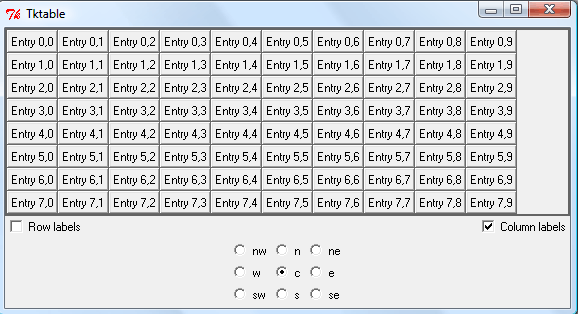
Il est simple pour la génération de tableaux avec des cellules de type texte. Il permet d'y mettre un entête et en plus, nous avons la possibilité de gérer le tri via un clic sur l'entête. La grille peut également être éditable. Son utilisation nécessite son installation.
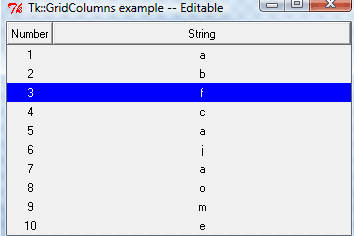
Ce module est déjà plus intéressant (pour les cellules de type texte) car en plus de l'entête, il permet de redimensionner automatiquement les colonnes et de paramétrer le tri via un clic sur le bouton d'une colonne d'entête. Sa mise en place n'est tout de même pas évidente et son utilisation nécessite son installation.
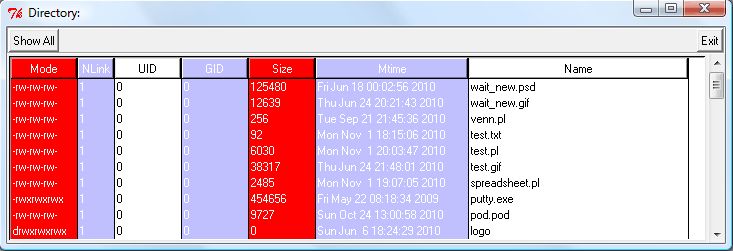
Ce module bien que nécessitant son installation, est le plus intéressant, efficace, complet et performant. Ecrit en C, ce module est très rapide même pour des tableaux volumineux. De plus, il est vraiment complet et configurable à souhait. Dans chaque cellule, on peut mettre du texte ou des widgets. Les tris et la fusion de cellules sont également possibles. Le redimensionnement des colonnes et des lignes, ainsi que la création d'entête sur une ou plusieurs lignes ou colonnes sont faisables. On peut créer un vrai classeur éditable.
Ce module contient un répertoire démo dans lequel il y a des programmes d'exemples. Voici un code illustrant ce que l'on peut faire.
| Code perl : | Sélectionner tout |
1 2 3 4 5 6 7 8 9 10 11 12 13 14 15 16 17 18 19 20 21 22 23 24 25 26 27 28 29 30 31 32 33 34 35 36 37 38 39 40 41 42 43 44 45 46 47 48 49 50 51 52 53 54 55 56 57 58 59 60 61 62 63 64 65 66 67 68 69 70 71 72 73 74 75 76 77 78 79 80 81 82 83 84 85 86 87 88 89 90 91 92 93 94 95 96 97 98 99 100 101 102 103 104 | #!/usr/bin/perl use warnings; use strict; use Tk; use Tk::TableMatrix; use utf8; my $mw = MainWindow->new( -title => 'Tableau TableMatrix', -background => 'snow', ); $mw->Label( -text => "Tableau redimensionnable à l'aide de TableMatrix", -background => 'snow', -font => '{arial} 12 bold' )->pack( -pady => 5 ); my $data = {}; # Création du tableau avec une ligne et une colonne my $table = $mw->Scrolled( 'TableMatrix', -rows => 1, -cols => 1, -width => 500, -height => 500, -variable => $data, -rowtagcommand => \&type_row, -background => "#454545", -titlerows => 1, -titlecols => 1, -drawmode => 'single', -selectmode => 'extended', -scrollbars => 'osoe', ); # Insertion de données dans le tableau for my $row ( 0 .. 20 ) { # Calcul du nombre de lignes dans le tableau my $number_rows = $table->cget( -rows ); # Insertion d'une ligne si nécessaire $table->insertRows( 'end', 1 ) if ( $number_rows < $row + 1 ); for my $col ( 0 .. 10 ) { # Calcul du nombre de lignes dans le tableau my $number_cols = $table->cget( -cols ); # Insertion d'une colonne si nécessaire $table->insertCols( 'end', 1 ) if ( $number_cols < $col + 1 ); # Ligne de titre if ( $row == 0 and $col != 0 ) { $data->{"$row,$col"} = "Colonne $col"; } # Colonne de titre elsif ( $col == 0 and $row != 0 ) { $data->{"$row,$col"} = "Ligne $row"; } elsif ( $col == 0 and $row == 0 ) { # rien ne se passe; } # Données else { $data->{"$row,$col"} = "($row,$col)"; } } } # Configuration des lignes paires et impaires $table->tagConfigure( 'pair_row', -bg => 'white', -fg => 'black', -relief => 'sunken', -state => 'disabled' ); $table->tagConfigure( 'impair_row', -bg => '#00C0E0', -fg => 'black', -relief => 'sunken', -state => 'disabled' ); $table->tagConfigure( 'title', -bg => '#F0E0FF', -fg => 'black', -relief => 'sunken' ); # Fusion des cellules 1,1 à 1,4 $table->spans( '1,1' => '0,3' ); $table->pack(qw/ -fill both -expand 1 -padx 10 -pady 10 /); MainLoop; # Permet d'assigner un tag aux lignes paires et impaires sub type_row { my $row = shift; my $tag_row = ( $row > 0 && $row % 2 == 0 ) ? "pair_row" : "impair_row"; return $tag_row; } |
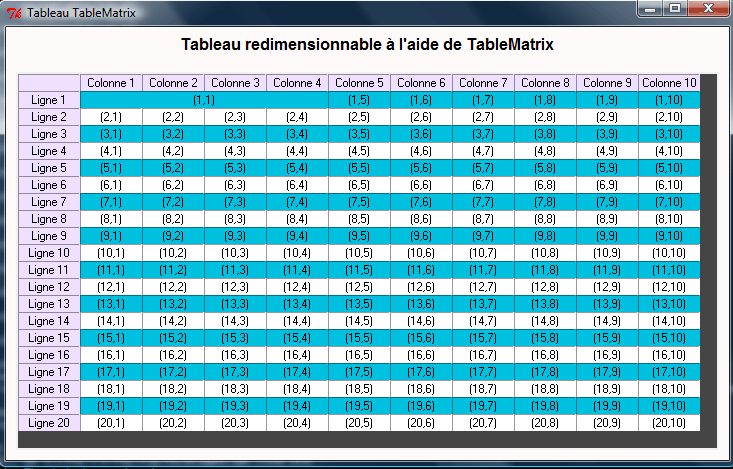
Je vous conseille de lire attentivement la documentation de ce module car elle est abondante. Mais l'utilisation du module est simple. Soyez donc patient !!
Voici deux programmes issus de la documentation du module :
| Code perl : | Sélectionner tout |
1 2 3 4 5 6 7 8 9 10 11 12 13 14 15 16 17 18 19 20 21 22 23 24 25 26 27 28 29 30 31 32 33 34 35 36 37 38 39 40 41 42 43 44 45 46 47 48 49 50 51 52 53 54 55 56 57 58 59 60 61 62 63 64 65 66 67 68 69 70 71 72 73 74 75 76 77 78 79 80 81 82 83 84 85 86 87 88 89 90 91 92 93 94 95 96 97 98 99 100 101 102 103 104 105 106 107 108 109 110 111 112 113 114 115 116 117 118 119 120 121 122 123 124 125 126 127 128 129 130 131 132 133 134 135 136 137 138 139 140 141 142 143 144 145 146 147 148 149 150 151 152 153 154 155 156 157 158 159 160 161 162 163 164 165 166 167 168 169 170 171 172 173 174 175 176 177 178 179 180 181 182 183 184 185 186 187 188 189 190 191 192 193 194 195 196 197 198 199 200 201 202 203 204 205 206 207 208 209 210 211 212 213 214 215 216 217 218 219 220 221 222 223 224 225 226 227 228 229 230 231 232 233 234 235 236 237 238 239 240 241 242 243 244 245 246 247 248 249 250 251 252 253 254 255 256 257 258 259 260 261 262 263 264 | #!/usr/bin/perl -w ## THIS IS ONE OF THE TEST SCRIPTS THAT HANS PROVIDED WITH MLISTBOX ## It IS STILL UNDERGOING EDITS BY ME - RCS ## MListbox demonstration application. This is a simple directory browser ## Original Author: Hans J. Helgesen, December 1999. ## Modified by: Rob Seegel, to work in Win32 as well ## Use and abuse this code. I did - RCS use File::stat; use Tk; use Tk::MListbox; ## Create main perl/tk window. my $mw = MainWindow->new; ## Create the MListbox widget. ## Specify alternative comparison routine for integers and date. ## frame, but since the "Show All" button references $ml, we have to create ## it now. my %red = qw(-bg red -fg white); my %green = qw(-bg green -fg white); my %white = qw(-fg black); my $ml = $mw->Scrolled( 'MListbox', -scrollbars => 'osoe', -background => 'white', -foreground => 'blue', -textwidth => 10, -highlightthickness => 2, -width => 0, -selectmode => 'browse', -bd => 2, -relief => 'sunken', -columns => [ [ qw/-text Mode -textwidth 10/, %red ], [ qw/-text NLink -textwidth 5/, %green, -comparecmd => sub { $_[0] <=> $_[1] } ], [ qw/-text UID/, %white ], [ qw/-text GID/, %green ], [ qw/-text Size/, %red, -comparecmd => sub { $_[0] <=> $_[1] } ], [ qw/-text Mtime/, %green, -comparecmd => \&compareDate ], [ qw/-text Name/, %white ] ] ); ## Put the exit button and the "Show All" button in ## a separate frame. my $f = $mw->Frame( -bd => 2, -relief => 'groove' )->pack(qw/-anchor w -expand 0 -fill x/); $f->Button( -text => 'Exit', -command => sub {exit} )->pack(qw/-side right -anchor e/); $f->Button( -text => 'Show All', -command => sub { foreach ( $ml->columnGet( 0, 'end' ) ) { $ml->columnShow($_); } } )->pack(qw/-side left -anchor w/); # Put the MListbox widget on the bottom of the main window. $ml->pack( -expand => 1, -fill => 'both', -anchor => 'w' ); # Double clicking any of the data rows calls openFileOrDir() # (But only directories are handled for now...) $ml->bindRows( "<Double-Button-1>", \&openFileOrDir ); # Right-clicking the column heading creates the hide/show popup menu. $ml->bindColumns( "<Button-3>", [ \&columnPopup ] ); $ml->bindRows( '<ButtonRelease-1>', sub { my ( $w, $infoHR ) = @_; print "You selected row: " . $infoHR->{-row} . " in column: " . $infoHR->{-column} . "\n"; } ); # Start by showing the current directory. directory("."); MainLoop; #---------------------------------------------------------- # sub directory { my ($dir) = @_; chdir($dir); my $pwd = `pwd`; chomp $pwd; $mw->title("Directory: $pwd"); # Empty $ml $ml->delete( 0, 'end' ); opendir( DIR, "." ) or die "Cannot open '.': $!\n"; foreach my $name ( readdir(DIR) ) { my $st = stat($name); my $mode = $st->mode; my $type = do { if ( -l $name ) { $mode = 0777; 'l'; } elsif ( -f $name ) { '-'; } elsif ( -d $name ) { 'd'; } elsif ( -p $name ) { 'p'; } elsif ( -b $name ) { 'b'; } elsif ( -c $name ) { 'c'; } else { ' '; } }; my $mtime = localtime( $st->mtime ); $mode = $type . convMode( $st->mode ); $ml->insert( 'end', [ $mode, $st->nlink, $st->uid, $st->gid, $st->size, $mtime, $name ] ); } } # This callback is called if the user double-clicks one of the rows in # the MListbox. If the selected file is a directory, open it. # sub openFileOrDir { my @sel = $ml->curselection; if ( @sel == 1 ) { my ( $mode, $name ) = ( $ml->getRow( $sel[0] ) )[ 0, 6 ]; if ( $mode =~ m/^d/ ) { # Directory? directory($name); } } } # This callback is called if the user right-clicks the column heading. # Create a popupmenu with hide/show options. sub columnPopup { my ( $w, $infoHR ) = @_; # Create popup menu. my $menu = $w->Menu( -tearoff => 0 ); my $index = $infoHR->{'-column'}; # First item is "Hide (this column)". # $menu->add( 'command', -label => "Hide " . $w->columnGet($index)->cget( -text ), -command => sub { $w->columnHide($index); } ); $menu->add('separator'); # Create a "Show" entry for each column that is not currently visible. # foreach ( $w->columnGet( 0, 'end' ) ) { # Get all columns from $w. unless ( $_->ismapped ) { $menu->add( 'command', -label => "Show " . $_->cget( -text ), -command => [ $w => 'columnShow', $_, -before => $index ], ); } } $menu->Popup( -popover => 'cursor' ); } # Converts a numeric file mode to the format provided by the ls command. # sub convMode { my $mode = shift; my $result = ''; $result .= ( $mode & 0400 ) ? 'r' : '-'; $result .= ( $mode & 0200 ) ? 'w' : '-'; if ( $mode & 0100 ) { if ( $mode & 04000 ) { $result .= 's'; } else { $result .= 'x'; } } else { $result .= '-'; } $result .= ( $mode & 040 ) ? 'r' : '-'; $result .= ( $mode & 020 ) ? 'w' : '-'; if ( $mode & 010 ) { if ( $mode & 02000 ) { if ( ( $mode & 02010 ) || ( $mode & 02030 ) || ( $mode & 02050 ) || ( $mode & 02070 ) ) { $result .= 's'; } else { $result .= 'l'; } } else { $result .= 'x'; } } else { $result .= '-'; } $result .= ( $mode & 04 ) ? 'r' : '-'; $result .= ( $mode & 02 ) ? 'w' : '-'; $result .= ( $mode & 01 ) ? 'x' : '-'; return $result; } # Callback for date comparison. Expects that the dates are on the format # "day mon dd hh:mm:ss yyyy", for example "Tue Dec 7 12:13:11 1999". # sub compareDate { my ( $d1, $d2 ) = @_; convertDate($d1) cmp convertDate($d2); } sub convertDate { my ($str) = @_; my ( $wday, $mon, $day, $hour, $min, $sec, $year ) = ( $str =~ m/(\S*)\s*(\S*)\s*(\d*)\s*(\d\d):(\d\d):(\d\d)\s*(\d\d\d\d)/ ); my $month = 0; foreach (qw/Jan Feb Mar Apr May Jun Jul Aug Sep Oct Nov Dec/) { if ( $mon eq $_ ) { last; } else { $month++; } } return sprintf( "%04d%02d%02d%02d%02d%02d", $year, $month, $day, $hour, $min, $sec ); } |
| Code perl : | Sélectionner tout |
1 2 3 4 5 6 7 8 9 10 11 12 13 14 15 16 17 18 19 20 21 22 23 24 25 26 27 28 29 30 31 32 33 34 35 36 37 38 39 40 41 42 43 44 45 46 47 48 49 50 51 52 53 54 55 56 57 58 59 60 61 62 63 64 65 66 67 68 69 70 71 72 73 74 75 76 77 78 79 80 81 82 83 84 85 86 87 88 89 90 91 92 93 94 95 96 97 98 99 100 101 102 103 104 105 106 107 108 109 110 111 112 113 114 115 116 117 118 119 120 121 122 123 124 125 126 127 128 129 130 131 132 133 134 135 136 137 138 139 140 141 142 143 144 145 146 147 148 149 | #!/usr/bin/perl -w # MListbox demonstration application. # Author: Hans J. Helgesen, December 1999. # # Before March 2000: # # Please send comments, suggestions and error reports to # hans_helgesen@hotmail.com. # # From March 2000: hans.helgesen@novit.no # use Tk; use Tk::MListbox; use Tk::Pane; use DBI; my $intro = <<EOT; This is a very simple DBI application that demonstrates the use of MListbox $Tk::MListbox::VERSION. * To execute a query, type the query in the query window and click "GO". * To resize any of the columns, drag the vertical bar to the RIGHT of the column. * To move any of the columns, drag the column header left or right. * To sort the table, click on any of the column headers. A new click will reverse the sort order. Note that this program calls MListbox->insert, MListbox->see and MListbox->update once FOR EACH ROW fetched from the database. This is not very efficient, a better approach would be to store all rows in an array, and then call MListbox->insert once when the query is done. EOT my $status = 'Idle'; # Check argument. if ( @ARGV != 3 ) { print STDERR "Usage: $0 source userid password\n"; print STDERR "Example: $0 dbi:Oracle:oradb peter secretpwd\n"; exit 1; } # Connect to the database. my $dbh = DBI->connect(@ARGV) or die "Can't connect: $DBI::errstr\n"; # Create Tk window... my $mw = new MainWindow; $mw->title("SQL $ARGV[1]\@$ARGV[0]"); $mw->Label( -text => $intro, -justify => 'left' )->pack( -anchor => 'w' ); my $f = $mw->Frame->pack( -fill => 'x', -anchor => 'w' ); my $text = $f->Scrolled( 'Text', -scrollbars => 'osoe', -width => 80, -height => 5 )->pack( -side => 'left', -expand => 1, -fill => 'both' ); $text->insert( 'end', "select * from all_objects where object_type='TABLE'" ); $f = $f->Frame->pack( -side => 'left' ); $f->Button( -text => 'Go', -command => sub { $mw->Busy( -recurse => 1 ); execSQL(); $mw->Unbusy; } )->pack; $f->Button( -text => 'Clear', -command => sub { $text->delete( '0.0', 'end' ); } )->pack; $f->Button( -text => 'Exit', -command => sub { $dbh->disconnect; exit; } )->pack; # Put the MListbox in a Pane, since the MListbox don't support horizontal # scrolling by itself. # $f = $mw->Frame->pack( -fill => 'x' ); $f->Label( -text => 'Status:' )->pack( -side => 'left' ); $f->Label( -textvariable => \$status )->pack( -side => 'left' ); my $ml = $mw->Scrolled( 'MListbox', -scrollbars => 'osoe' )->pack( -expand => 1, -fill => 'both' ); MainLoop; #-------------------------------------------------------------------- # sub execSQL { # Get the query from the text widget. my $sql = $text->get( '0.0', 'end' ); $status = 'Call prepare()'; $mw->update; my $sth = $dbh->prepare($sql); unless ( defined $sth ) { $text->insert( 'end', "\nprepare() failed: $DBI::errstr\n" ); return; } $status = 'Call execute()'; $mw->update; unless ( $sth->execute ) { $text->insert( 'end', "\nexecute() failed: $DBI::errstr\n" ); return; } # Query OK, delete all old columns in $ml. # $ml->columnDelete( 0, 'end' ); my $headings_defined = 0; $status = 'Call fetchrow()'; $mw->update; my $rowcnt = 0; while ( my $hashref = $sth->fetchrow_hashref ) { unless ($headings_defined) { foreach ( sort keys %$hashref ) { $ml->columnInsert( 'end', -text => $_ ); } $headings_defined = 1; } my @row = (); foreach ( sort keys %$hashref ) { push @row, $hashref->{$_}; } $ml->insert( 'end', [@row] ); $ml->see('end'); $rowcnt++; $status = "$rowcnt rows fetched"; $ml->update; } $status = 'Idle'; } |
Etant donné qu'il n'est pas toujours évident de trouver les exemples fournis dans les modules du CPAN, je vous propose quelques programmes provenant de  Tk::TableMatrix.
Tk::TableMatrix.
| Code perl : | Sélectionner tout |
1 2 3 4 5 6 7 8 9 10 11 12 13 14 15 16 17 18 19 20 21 22 23 24 25 26 27 28 29 30 31 32 33 34 35 36 37 38 39 40 41 42 43 44 | #!/usr/bin/perl use warnings; use strict; use Tk; use Tk::TableMatrix; my $top = MainWindow->new; my $arrayVar = {}; for my $r ( 0 .. 7 ) { for my $c ( 0 .. 7 ) { $arrayVar->{"$r,$c"} = 'test'; } } my $t = $top->Scrolled( 'TableMatrix', -variable => $arrayVar, -selectmode => 'extended', -bg => 'white', -fg => 'black', ); $t->configure( -browsecmd => sub { my ( $previous_index, $current_index ) = @_; if ( $previous_index =~ m{^\d+,\d+$} ) { my $value_previous_cell = $t->get($previous_index); # check and validation if ( $value_previous_cell =~ s{^(\d+)/(\d+)$}{$1/$2/2010} ) { $t->activate($previous_index); $t->curvalue($value_previous_cell); $t->activate($current_index); } } }, ); $t->pack( -expand => 1, -fill => 'both' ); MainLoop; |

| Code perl : | Sélectionner tout |
1 2 3 4 5 6 7 8 9 10 11 12 13 14 15 16 17 18 19 20 21 22 23 24 25 26 27 28 29 30 31 32 33 34 35 36 37 38 39 40 41 42 43 44 45 46 47 48 49 50 51 52 53 54 55 56 57 58 59 60 61 62 63 64 65 66 67 68 69 70 71 72 73 74 75 76 77 78 79 80 81 82 83 84 85 86 87 88 89 90 91 92 93 94 95 96 97 98 99 100 | ## buttons.tcl ## ## demonstrates the simulation of a button array ## ## ellson@lucent.com ## modifications made by jeff.hobbs@acm.org ## Mdofied by John Cerney for perl/tk use Tk; use Tk::TableMatrix; use Data::Dumper qw( DumperX); my $top = MainWindow->new; my $tab = {}; my ( $rows, $cols ) = ( 10, 10 ); # number of rows/cols # create the table my $t = $top->Scrolled( 'TableMatrix', -rows => $rows, -cols => $cols, -titlerows => 1, -titlecols => 1, -roworigin => -1, -colorigin => -1, -colwidth => 4, -width => 8, -height => 8, -variable => $tab, -flashmode => 'off', -cursor => 'top_left_arrow', -borderwidth => 2, -state => 'disabled' ); $t->pack; # set up tags for the various states of the buttons $t->tagConfigure( 'OFF', -bg => 'red', -relief => 'raised' ); $t->tagConfigure( 'ON', -bg => 'green', -relief => 'sunken' ); $t->tagConfigure( 'sel', -bg => 'gray75', -relief => 'flat' ); # clean up if mouse leaves the widget $t->bind( '<FocusOut>', sub { my $w = shift; $w->selectionClear('all'); } ); # highlight the cell under the mouse $t->bind( '<Motion>', sub { my $w = shift; my $Ev = $w->XEvent; if ( $w->selectionIncludes( '@' . $Ev->x . "," . $Ev->y ) ) { Tk->break; } $w->selectionClear('all'); $w->selectionSet( '@' . $Ev->x . "," . $Ev->y ); Tk->break; ## "break" prevents the call to TableMatrixCheckBorder } ); # mousebutton 1 toggles the value of the cell # use of "selection includes" would work here $t->bind( '<1>', sub { my $w = shift; $w->focus; my $dude = $w->curselection; my ($rc) = @{ $w->curselection }; my $var = $w->cget( -var ); if ( $var->{$rc} =~ /ON/ ) { $var->{$rc} = 'OFF'; $w->tagCell( 'OFF', $rc ); } else { $var->{$rc} = 'ON'; $w->tagCell( 'ON', $rc ); } } ); # inititialize the array, titles, and celltags for ( $i = 0; $i < $rows; $i++ ) { $tab->{"$i,-1"} = $i; for ( $j = 0; $j < $cols; $j++ ) { unless ($i) { $tab->{"-1,$j"} = $j; } $tab->{"$i,$j"} = "OFF"; $t->tagCell( 'OFF', "$i,$j" ); } } Tk::MainLoop; |
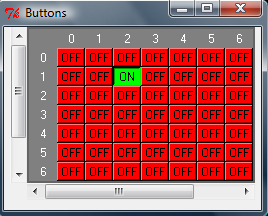
| Code perl : | Sélectionner tout |
1 2 3 4 5 6 7 8 9 10 11 12 13 14 15 16 17 18 19 20 21 22 23 24 25 26 27 28 29 30 31 32 33 34 35 36 37 38 39 40 41 42 43 44 45 46 47 48 49 50 51 52 53 54 55 56 57 58 59 60 61 62 63 64 65 66 67 68 69 70 71 72 73 74 75 76 77 78 79 80 81 82 83 84 85 86 87 88 89 90 91 92 93 94 95 96 97 98 99 100 101 102 103 104 105 106 107 108 109 110 111 112 113 114 115 116 117 118 119 120 121 122 123 124 125 126 127 128 | ## command.tcl ## ## This demo shows the use of the table widget's -command options ## ## jeff.hobbs@acm.org ## Converted to perl/tk by John Cerney use Tk; use Tk::TableMatrix; my ( $rows, $cols ) = ( 10, 10 ); # number of rows/cols my $top = MainWindow->new; # Sub to fill the array variable sub fill { my ( $array, $x, $y ) = @_; my ( $i, $j ); for ( $i = -$x; $i < $x; $i++ ) { for ( $j = -$y; $j < $y; $j++ ) { $array->{"$i,$j"} = "$i x $j"; } } } ## Test out the use of a callback to define tags on rows and columns sub rowSub { my $row = shift; return "OddRow" if ( $row > 0 && $row % 2 ); } sub colSub { my $col = shift; return "OddCol" if ( $col > 0 && $col % 2 ); } sub tblCmd { my ( $array, $set, $row, $col, $val ) = @_; # my @args = @_; # print "In Table Command, Args = '".join("', '",@args)."'\n"; my $index = "$row,$col"; if ($set) { $array->{$index} = $val; } else { if ( defined( $array->{$index} ) ) { return $array->{$index}; } else { return ''; } } } my $label = $top->Label( -text => "TableMatrix -command Example" ); # Label the changes with the value of currentTest my $currentText = ''; my $currentLabel = $top->Label( -textvariable => \$currentText ); # Entry that changes with the value of activeText my $activeText = ''; my $activeEntry = $top->Entry( -textvariable => \$activeText ); my $arrayVar = {}; fill( $arrayVar, $rows, $cols ); # fill up the array variable my $t = $top->Scrolled( 'TableMatrix', -rows => $rows, -cols => $cols, -width => 6, -height => 6, -titlerows => 1, -titlecols => 2, -command => [ \&tblCmd, $arrayVar ], -roworigin => -1, -colorigin => -2, -rowtagcommand => \&rowSub, -coltagcommand => \&colSub, -selectmode => 'extended', -flashmode => 'on', -variable => $arrayVar, ); $t->configure( -browsecommand => sub { my ($index) = @_; $currentText = $index; $activeText = $t->get($index); } ); $t->configure( -validate => 1, -validatecommand => sub { my ( $row, $col, $old, $new, $index ) = @_; $activeText = $new; return 1; } ); $t->configure( -selectioncommand => sub { my ( $NumRows, $Numcols, $selection, $noCells ) = @_; my @args = @_; print "In Selection Command, Args = '" . join( "', '", @args ) . "'\n"; return $selection; } ); # hideous Color definitions here: $t->tagConfigure( 'OddRow', -bg => 'orange', -fg => 'purple' ); $t->tagConfigure( 'OddCol', -bg => 'brown', -fg => 'pink' ); $t->colWidth( -2 => 7, -1 => 7, 1 => 5, 2 => 8, 4 => 14 ); $label->pack( -expand => 1, -fill => 'both' ); $currentLabel->pack( -expand => 1, -fill => 'both' ); $activeEntry->pack( -expand => 1, -fill => 'both' ); $t->pack( -expand => 1, -fill => 'both' ); Tk::MainLoop; |
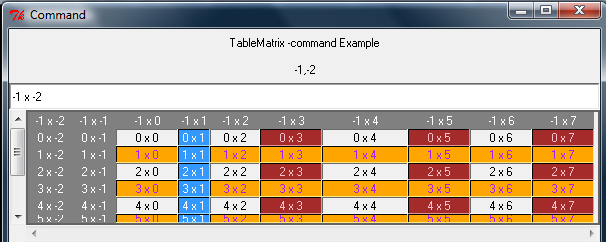
| Code perl : | Sélectionner tout |
1 2 3 4 5 6 7 8 9 10 11 12 13 14 15 16 17 18 19 20 21 22 23 24 25 26 27 28 29 30 31 32 33 34 35 36 37 38 39 40 41 42 43 44 45 46 47 48 49 50 51 52 53 54 55 56 57 58 59 60 61 62 63 64 65 66 67 68 69 70 71 72 73 74 75 76 77 78 79 80 81 82 83 84 85 86 87 88 89 90 91 92 93 94 95 96 97 98 99 100 101 102 103 104 105 106 107 108 109 110 111 112 113 114 115 116 117 | ## version2.tcl ## ## This demo uses most features of the table widget ## ## jeff.hobbs@acm.org ## Converted to perl/tk by John Cerney use Tk; use Tk::TableMatrix; my ( $rows, $cols ) = ( 25, 20 ); # number of rows/cols my $top = MainWindow->new; # Sub to fill the array variable sub fill { my ( $array, $x, $y ) = @_; my ( $i, $j ); for ( $i = -$x; $i < $x; $i++ ) { for ( $j = -$y; $j < $y; $j++ ) { $array->{"$i,$j"} = "r$i,c$j"; } } } ## Test out the use of a callback to define tags on rows and columns sub colSub { my $col = shift; return "OddCol" if ( $col > 0 && $col % 2 ); } my $label = $top->Label( -text => "TableMatrix v2 Example" ); my $arrayVar = {}; fill( $arrayVar, $rows, $cols ); # fill up the array variable my $t = $top->Scrolled( 'TableMatrix', -rows => $rows, -cols => $cols, -variable => $arrayVar, -width => 6, -height => 8, -titlerows => 1, -titlecols => 2, -roworigin => -5, -colorigin => -2, -coltagcommand => \&colSub, -selectmode => 'extended', -selecttitles => 0, -drawmode => 'single', ); my $button = $top->Button( -text => "Exit", -command => sub { $top->destroy } ); $label->pack( -expand => 1, -fill => 'both' ); $t->pack( -expand => 1, -fill => 'both' ); $button->pack( -expand => 1, -fill => 'both' ); # hideous Color definitions here: $t->tagConfigure( 'OddCol', -bg => 'brown', -fg => 'pink' ); $t->tagConfigure( 'title', -bg => 'red', -fg => 'blue', -relief => 'sunken' ); $t->tagConfigure( 'dis', -state => 'disabled' ); my $i = -1; my $first = $t->cget( -colorigin ); my $anchor; foreach $anchor (qw/ n s e w nw ne sw se c /) { $t->tagConfigure( $anchor, -anchor => $anchor ); $t->tagRow( $anchor, ++$i ); $t->set( "$i,$first", $anchor ); } $top->fontCreate( 'courier', -family => 'courier', -size => 10 ); $t->tagConfigure( 's', -font => 'courier', -justify => 'center' ); # $initWindow->Label(-image => $top->Photo(-file => Tk->findINC('Xcamel.gif')))->pack; my $perltkLogo = $top->Photo( -file => Tk->findINC('Xcamel.gif') ); $t->tagConfigure( 'logo', -image => $perltkLogo, -showtext => 1 ); $t->tagCell( 'logo', '1,2', '2,3', '4,1' ); $t->tagCell( 'dis', '2,1', '1,-1', '3,0' ); $t->colWidth(qw/ -2 8 -1 9 0 12 4 14/); $t->set( '1,1' => "multi-line\ntext\nmight be\ninteresting", '3,2' => "more\nmulti-line\nplaying\n", '2,2' => "null\0byte" ); $i = -1; # This is in the row span my $l = $top->Label( -text => "Window s", -bg => 'yellow' ); $t->windowConfigure( "6,0", -sticky => 's', -window => $l ); # This is in the row titles $l = $top->Label( -text => "Window ne", -bg => 'yellow' ); $t->windowConfigure( "4,-1", -sticky => 'ne', -window => $l ); # This will get swallowed by a span $l = $top->Label( -text => "Window ew", -bg => 'yellow' ); $t->windowConfigure( "5,3", -sticky => 'ew', -window => $l ); # This is in the col titles $l = $top->Label( -text => "Window nsew", -bg => 'yellow' ); $t->windowConfigure( "-5,1", -sticky => 'nsew', -window => $l ); $l = $t->parent->Label( -text => "Sibling l", -bg => 'orange' ); $t->windowConfigure( "5,1", -sticky => 'nsew', -window => $l ); $t->spans( '-1,-2' => '0,3', '1,2' => '0,5', '3,2' => '2,2', '6,0' => '4,0' ); Tk::MainLoop; |
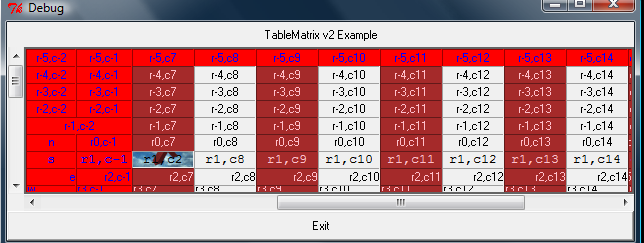
| Code perl : | Sélectionner tout |
1 2 3 4 5 6 7 8 9 10 11 12 13 14 15 16 17 18 19 20 21 22 23 24 25 26 27 28 29 30 31 32 33 34 35 36 37 38 39 40 41 42 43 44 45 46 47 48 49 50 51 52 53 54 55 56 57 58 59 60 61 62 63 64 65 66 67 68 69 70 71 72 73 74 75 76 77 78 79 80 81 82 83 84 85 86 87 88 89 90 91 92 93 94 95 96 97 98 99 100 101 102 103 104 105 106 107 108 109 110 111 112 113 114 115 116 117 118 119 120 121 122 123 124 125 126 127 128 129 130 131 132 133 134 135 136 137 138 139 140 141 142 143 144 145 146 147 148 149 150 151 152 153 154 155 156 157 158 159 160 161 162 163 164 165 166 167 168 169 170 171 172 173 174 175 176 177 178 179 180 181 182 183 184 185 186 187 188 189 190 191 192 193 194 195 196 197 198 199 200 201 202 203 204 205 206 207 208 209 210 211 212 213 214 215 216 217 218 219 220 221 222 223 224 225 226 227 228 229 230 231 232 233 234 235 236 237 238 239 240 241 242 243 244 245 246 247 248 249 250 251 252 253 254 255 256 257 258 259 260 261 262 263 264 265 266 267 268 269 270 271 272 273 274 275 276 277 278 279 280 281 282 283 284 285 286 287 288 289 290 291 292 293 294 295 296 297 298 299 300 301 302 303 304 305 306 307 308 309 310 311 312 313 314 315 316 317 318 319 320 321 322 323 324 325 326 327 328 329 330 331 332 333 334 335 336 337 338 339 340 341 342 | ## edit_styles.pl ## ## demonstrates different edit styles within cells ## ## ewaldhei@idd.com ## This script uses tags and some logic to simulate check ## buttons, browseEntries, etc in cells. This approach is ## faster than using embedded windows, especially for large ## tables. use Tk; use Tk::TableMatrix; main(); sub main { my $top = MainWindow->new; my $_data = {}; my ( $rows, $cols ) = ( 12, 7 ); # number of rows/cols # create the table my $t = $top->Scrolled( TableMatrix => -rows => $rows, -cols => $cols, -titlerows => 1, -titlecols => 1, -width => 8, -height => 8, -colwidth => 11, -variable => $_data, -cursor => 'top_left_arrow', -borderwidth => 2, -ipadx => 15, -scrollbars => 'se', )->pack(qw/-expand 1 -fill both/); my $tm = $t->Subwidget('scrolled'); $tm->{columneditstyles} = { qw(1 readonly 2 editable 3 button 4 optionmenu 5 browseentry 6 checkbutton ) }; # set up tags for the various states of the buttons $t->tagConfigure( 'OFF', -bg => 'gray60', -relief => 'raised' ); $t->tagConfigure( 'ON', -bg => 'gray80', -relief => 'sunken' ); $t->tagConfigure( 'sel', -bg => 'gray70', -relief => 'flat' ); $t->tagConfigure( 'readonly', -relief => 'groove' ); my %images = define_bitmaps($top); $t->tagConfigure( 'optionmenu', -image => $images{optionmenu}, -anchor => 'e', -showtext => 1, ); $t->tagConfigure( 'browseentry', -image => $images{browseentry}, -anchor => 'e', -showtext => 1 ); $t->tagConfigure( 'checkbutton0', -image => $images{checkbutton0} ); $t->tagConfigure( 'checkbutton1', -image => $images{checkbutton1} ); $t->bind( '<Key-Escape>' => \&end_edit ); # clean up if mouse leaves the widget $t->bind( '<FocusOut>', sub { my $w = shift; $w->selectionClear('all'); $w->configure( -state => 'disabled' ); } ); # highlight the cell under the mouse $t->bind( '<Motion>', sub { my $w = shift; my $Ev = $w->XEvent; if ( $w->selectionIncludes( '@' . $Ev->x . "," . $Ev->y ) ) { Tk->break; } $w->selectionClear('all'); $w->selectionSet( '@' . $Ev->x . "," . $Ev->y ); Tk->break; ## "break" prevents the call to TableMatrixCheckBorder } ); # mousebutton 1 edits the cell (or not) appropriately $t->bind( '<1>', sub { my ($w) = @_; withdraw_edit_widgets($w); my $Ev = $w->XEvent; my ( $x, $y ) = ( $Ev->x, $Ev->y ); my $rc = $w->index("\@$x,$y"); my $var = $w->cget( -var ); my ( $r, $c ) = split( /,/, $rc ); $r && $c || return; $w->{_b1_row_col} = "$r,$c"; set_style_state($w); my $style = $w->{columneditstyles}{$c} || 'editable'; if ( $style eq 'optionmenu' || $style eq 'browseentry' ) { setup_toplevel_lbox( $w, $r, $c ); } elsif ( $style eq 'button' ) { my $newval = $var->{$rc} =~ /ON/ ? 'OFF' : 'ON'; $var->{$rc} = $newval; $w->tagCell( $newval, $rc ); } elsif ( $style eq 'checkbutton' ) { $var->{$rc} = !$var->{$rc}; my $tag = $var->{$rc} ? 'checkbutton1' : 'checkbutton0'; $w->tagCell( $tag, $rc ); } } ); # replace std b1-release $t->bind( 'Tk::TableMatrix' => '<ButtonRelease-1>', \&set_style_state ); # inititialize the array, titles, and celltags for ( my $r = 0; $r < $rows; $r++ ) { for ( my $c = 0; $c < $cols; $c++ ) { my $rc = "$r,$c"; if ( !$r || !$c ) { $_data->{$rc} = $r || $tm->{columneditstyles}{$c} || ""; } else { $_data->{$rc} = $rc; my $style = $tm->{columneditstyles}{$c} || 'editable'; if ( $style eq 'readonly' ) { $t->tagCell( 'readonly', $rc ); } if ( $style eq 'optionmenu' ) { $_data->{$rc} = "$r options"; $t->tagCell( 'optionmenu', $rc ); } elsif ( $style eq 'browseentry' ) { $_data->{$rc} = "browse$r"; $t->tagCell( 'browseentry', $rc ); } elsif ( $style eq 'button' ) { $_data->{$rc} = $r % 4 ? 'ON' : 'OFF'; $t->tagCell( $_data->{$rc}, $rc ); } elsif ( $style eq 'checkbutton' ) { $_data->{$rc} = $r % 3 ? 0 : 1; $t->tagCell( 'checkbutton' . $_data->{$rc}, $rc ); } } } } Tk::MainLoop; } sub set_style_state { my ($w) = @_; my ( $r, $c ) = split( /,/, $w->{_b1_row_col} ); if ( grep( !$w->{columneditstyles}{$c} || $_ eq $w->{columneditstyles}{$c}, qw(optionmenu readonly button checkbutton) ) ) { $w->selectionClear('all'); $w->configure( state => 'disabled' ); } else { $w->configure( state => 'normal' ); $w->activate( $w->{_b1_row_col} ); } } sub end_edit { my ($w) = @_; $w->configure( -state => 'disabled' ); $w->selectionClear('all'); } sub setup_toplevel_lbox { my ( $w, $r, $c ) = @_; my $toplevel = $w->{toplevel} ||= $w->Toplevel( -bd => 2, -relief => 'raised' ); my $lbox = $toplevel->{lbox}; $lbox->destroy() if $lbox; $toplevel->overrideredirect(1); my @options = map( chr( ord('A') + $_ - 1 ) x $_, 1 .. $r ); my $height = @options > 8 ? 8 : ( @options || 1 ); my $width = 2; foreach (@options) { $width = length($_) if length($_) > $width; } $lbox = $toplevel->{lbox} = $toplevel->Scrolled( Listbox => -height => $height, -width => $width + 1, -relief => 'raised', -borderwidth => 1, -highlightthickness => 0, -bg => $w->cget('bg'), -scrollbars => 'oe', )->pack( -side => 'left' ); $lbox->Subwidget('scrolled')->{_table_matrix} = $w; $lbox->delete( 0, 'end' ); $lbox->insert( 0, @options ); my ( $gx, $gy ) = ( $w->rootx(), $w->rooty() ); my @bbox = $w->bbox("$r,$c"); my ( $mx, $my ) = ( int( $gx + $bbox[0] + $bbox[2] ), int( $gy + $bbox[1] ) ); my $toplevel_ypixels = $height * $bbox[3] + $toplevel->cget("-bd") * 2 + $toplevel->cget("-highlightthickness"); my $y2 = $my + $toplevel_ypixels; $my = $w->vrootheight - $toplevel_ypixels if ( $y2 > $w->vrootheight ); $toplevel->transient( $w->toplevel() ); $toplevel->geometry("+$mx+$my"); $toplevel->deiconify(); $toplevel->raise(); $lbox->bind( '<ButtonRelease-1>', sub { my ($lbox) = @_; my $i = $lbox->curselection(); my $val = $lbox->get($i); my $w = delete $lbox->{_table_matrix}; my $rc = delete $w->{_b1_row_col}; my $var = $w->cget( -var ); $var->{$rc} = $val; $w->set( $rc => $val ); $w->selectionClear('all'); $w->configure( -state => 'disabled' ); withdraw_edit_widgets($w); } ); } sub withdraw_edit_widgets { my ($w) = @_; my $toplevel = $w->{toplevel}; if ( $toplevel && $toplevel->state eq 'normal' ) { $toplevel->withdraw(); } } #-------------------------------------------------------------- sub define_bitmaps { my ($w) = @_; my $optionmenu = ' /* XPM */ static char * xpm[] = { "11 5 3 1", " c None", "+ c #D0D0D0", "@ c #555555", "+++++++++++", "++++++++++@", "++ @@", "++@@@@@@@@@", "+@@@@@@@@@@"}; '; my $browseentry = ' /* XPM */ static char * xpm[] = { "11 7 3 1", " c None", "+ c #D0D0D0", "@ c #555555", "+++++++++++", "++++++++++@", "+++ @@@", " +++ @@@ ", " +++ @@@ ", " ++@@@ ", " @@@ ", }; '; my $cbutton0 = ' /* XPM */ static char * xpm[] = { "9 8 3 1", " c None", "@ c #B8B8B8", "+ c #555555", "+++++++++", "++++++++@", "++ @@", "++ @@", "++ @@", "++ @@", "++@@@@@@@", "+@@@@@@@@"}; }; '; my $cbutton1 = ' /* XPM */ static char * xpm[] = { "9 8 4 1", " c None", "@ c #B8B8B8", "+ c #555555", ". c #FF0000", "+++++++++", "++++++++@", "++.....@@", "++.....@@", "++.....@@", "++.....@@", "++@@@@@@@", "+@@@@@@@@"}; }; '; my %images; $images{optionmenu} = $w->Pixmap( 'optionmenu', -data => $optionmenu ); $images{browseentry} = $w->Pixmap( 'browseentry', -data => $browseentry ); $images{checkbutton0} = $w->Pixmap( 'cbutton0', -data => $cbutton0 ); $images{checkbutton1} = $w->Pixmap( 'cbutton1', -data => $cbutton1 ); %images; } |
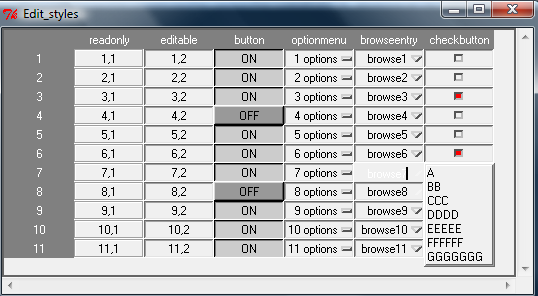
| Code perl : | Sélectionner tout |
1 2 3 4 5 6 7 8 9 10 11 12 13 14 15 16 17 18 19 20 21 22 23 24 25 26 27 28 29 30 31 32 33 34 35 36 37 38 39 40 41 42 43 44 45 46 47 48 49 50 51 52 53 54 55 56 57 58 59 60 61 62 63 64 65 66 67 68 69 70 71 72 73 74 | ########## ### Demo of using embedded windows in TableMatrix ### This works well, but can be slow for very large tables with many ### windows. ### ### See edit_styles.pl for an alternative that is faster for larger ### tables use Tk; use Tk::BrowseEntry; use Tk::TableMatrix; use Data::Dumper qw( DumperX); my $top = MainWindow->new; my $arrayVar = {}; foreach my $row ( 0 .. 20 ) { foreach my $col ( 0 .. 10 ) { $arrayVar->{"$row,$col"} = "r$row, c$col"; } } my $t = $top->Scrolled( 'TableMatrix', -rows => 21, -cols => 11, -width => 6, -height => 6, -titlerows => 1, -titlecols => 1, -variable => $arrayVar, -selectmode => 'extended', -resizeborders => 'both', -titlerows => 1, -titlecols => 1, -bg => 'white', # -state => 'disabled' # -colseparator => "\t", # -rowseparator => "\n" ); $t->tagConfigure( 'active', -bg => 'gray90', -relief => 'sunken' ); $t->tagConfigure( 'title', -bg => 'gray85', -fg => 'black', -relief => 'sunken' ); ################ Put in some embedded windows ################ my $l = $top->Checkbutton( -text => 'CheckButton' ); $t->windowConfigure( "3,3", -sticky => 's', -window => $l ); my $c = $top->BrowseEntry( -label => "Month:" ); $c->insert( "end", "January" ); $c->insert( "end", "February" ); $c->insert( "end", "March" ); $c->insert( "end", "April" ); $c->insert( "end", "May" ); $c->insert( "end", "June" ); $c->insert( "end", "July" ); $c->insert( "end", "August" ); $c->insert( "end", "September" ); $c->insert( "end", "October" ); $c->insert( "end", "November" ); $c->insert( "end", "December" ); $t->windowConfigure( "2,2", -sticky => 'ne', -window => $c ); # Leave enough room for the windows $t->colWidth( 2, 20 ); $t->colWidth( 3, 20 ); $t->pack( -expand => 1, -fill => 'both' ); Tk::MainLoop; |
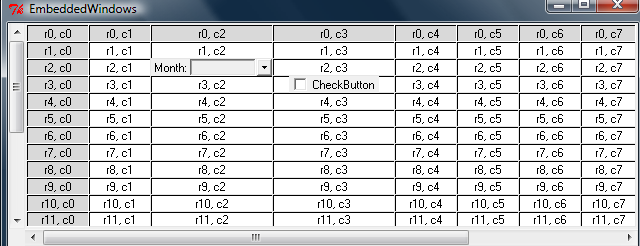
| Code perl : | Sélectionner tout |
1 2 3 4 5 6 7 8 9 10 11 12 13 14 15 16 17 18 19 20 21 22 23 24 25 26 27 28 29 30 31 32 33 34 35 36 37 38 39 40 41 42 43 44 45 46 47 48 49 50 51 52 53 54 55 56 57 58 59 60 61 62 63 64 65 66 67 68 69 70 71 72 73 74 75 76 | ## maxsize.tcl ## ## This demo uses a really big table. The big startup time is in ## filling the table's Tcl array var. ## ## jeff.hobbs@acm.org ## Converted to perl/tk by John Cerney 7/24/00 use Tk; use Tk::TableMatrix; my $top = MainWindow->new; my $arrayVar = {}; print "Filling Array...\n"; my ( $rows, $cols ) = ( 40000, 10 ); foreach my $row ( 0 .. ( $rows - 1 ) ) { foreach my $col ( 0 .. ( $cols - 1 ) ) { $arrayVar->{"$row,$col"} = "$row,$col"; } } print "Creating Table...\n"; ## Test out the use of a callback to define tags on rows and columns sub colSub { my $col = shift; return "OddCol" if ( $col > 0 && $col % 2 ); } my $label = $top->Label( -text => "TableMatrix v2 Example" ); my $t = $top->Scrolled( 'TableMatrix', -rows => $rows, -cols => $cols, -width => 6, -height => 6, -titlerows => 1, -titlecols => 1, -variable => $arrayVar, -coltagcommand => \&colSub, -colstretchmode => 'last', -rowstretchmode => 'last', -selectmode => 'extended', -selecttitles => 0, -drawmode => 'slow', ); my $button = $top->Button( -text => "Exit", -command => sub { $top->destroy } ); # hideous Color definitions here: $t->tagConfigure( 'OddCol', -bg => 'brown', -fg => 'pink' ); $t->tagConfigure( 'title', -bg => 'red', -fg => 'blue', -relief => 'sunken' ); $t->tagConfigure( 'dis', -state => 'disabled' ); my $i = -1; my $first = $t->cget( -colorigin ); my $anchor; foreach $anchor (qw/ n s e w nw ne sw se c /) { $t->tagConfigure( $anchor, -anchor => $anchor ); $t->tagRow( $anchor, ++$i ); $t->set( "$i,$first", $anchor ); } $top->fontCreate( 'courier', -family => 'courier', -size => 10 ); $t->tagConfigure( 's', -font => 'courier', -justify => 'center' ); $t->colWidth( -2 => 8, -1 => 9, 0 => 12, 4 => 14 ); $label->pack( -expand => 1, -fill => 'both' ); $t->pack( -expand => 1, -fill => 'both' ); $button->pack( -expand => 1, -fill => 'both' ); Tk::MainLoop; |
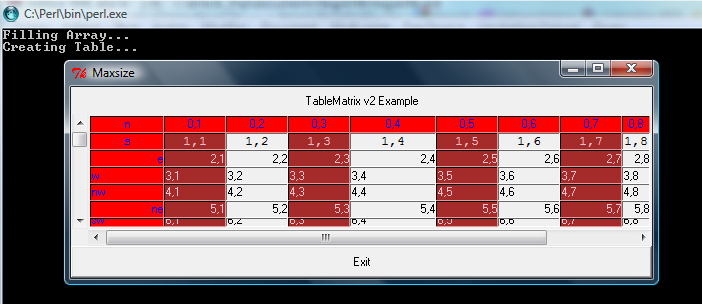
| Code perl : | Sélectionner tout |
1 2 3 4 5 6 7 8 9 10 11 12 13 14 15 16 17 18 19 20 21 22 23 24 25 26 27 28 29 30 31 32 33 34 35 36 37 38 39 40 41 42 43 44 45 46 47 48 49 50 51 52 53 54 55 56 57 58 59 60 61 62 63 64 65 66 67 68 69 70 71 72 73 74 75 76 77 78 79 80 81 82 83 84 85 86 87 88 89 90 91 92 93 94 95 96 97 98 99 100 101 102 103 104 105 106 107 108 109 110 111 112 113 114 115 116 117 118 119 120 121 122 123 124 125 126 127 128 129 130 131 132 133 134 135 136 137 138 139 140 | ## spreadsheet.tcl ## ## This demos shows how you can simulate a 3D table ## and has other basic features to begin a basic spreadsheet ## ## jeff.hobbs@acm.org ## Converted to perl/tk by John Cerney use Tk; use Tk::TableMatrix; my ( $rows, $cols ) = ( 10, 10 ); # number of rows/cols my $page = 'AA'; my $oldPage = ''; my $tableColors = { default => 'pink', AA => 'orange', BB => 'blue', CC => 'green' }; my $top = MainWindow->new; sub colorize { my ($num) = @_; return 'colored' if ( $num > 0 && $num % 2 ); return ''; } # Sub to fill the array variable sub fill { my ( $name, $array, $r, $c ) = @_; my ( $i, $j ); $r ||= $rows; $c ||= $cols; for ( $i = 0; $i < $r; $i++ ) { for ( $j = 0; $j < $c; $j++ ) { if ( $j && $i ) { $array->{"$i,$j"} = "$name $i,$j"; } elsif ($i) { $array->{"$i,$j"} = "$i"; } elsif ($j) { $array->{"$i,$j"} = sprintf( "%c", ( $j + 64 ) ); } } } } my $arrayVar = { AA => {}, BB => {}, CC => {} }; fill( 'AA', $arrayVar->{AA}, $rows, $cols ); # fill up the array variable fill( 'BB', $arrayVar->{BB}, $rows / 2, $cols / 2 ); # fill up the array variable my $t = $top->Scrolled( 'TableMatrix', -rows => $rows, -cols => $cols, -width => 5, -height => 5, -titlerows => 1, -titlecols => 1, -coltagcommand => \&colorize, -selectmode => 'extended', -flashmode => 'on', -variable => $arrayVar->{$page}, ); my $label = $top->Label( -text => "TableMatrix vs Spreadsheet Example" ); # Label the changes with the value of currentTest my $currentText = ''; my $currentLabel = $top->Label( -textvariable => \$currentText ); # Entry that changes with the value of activeText my $activeText = ''; my $activeEntry = $top->Entry( -textvariable => \$activeText ); my $pageLabel = $top->Label( -text => 'PAGE:', -width => 6, -anchor => 'e' ); my $pageSelect = $top->Optionmenu( -options => [qw/ AA BB CC/], -variable => \$page, -command => [ \&changepage ] ); sub changepage { my ($newPage) = @_; if ( $newPage ne $oldPage ) { $t->selectionClear('all'); $t->activate(''); # unactivate anything $t->configure( -variable => $arrayVar->{$newPage} ); # $e config -textvar ${i}(active) $t->activate('origin'); if ( exists $tableColors->{$newPage} ) { $t->tagConfigure( 'colored', -bg => $tableColors->{$newPage} ); } else { $t->tagConfigure( 'colored', -bg => $tableColors->{'default'} ); } $t->see('active'); $oldPage = $newPage; } } $t->configure( -browsecommand => sub { my ( $oldindex, $index ) = @_; $currentText = $index; $activeText = $t->get($index); } ); # hideous Color definitions here: $t->tagConfigure( 'colored', -bg => $tableColors->{$page} ); $t->tagConfigure( 'title', -fg => 'red', -relief => 'groove' ); $t->tagConfigure( 'blue', -bg => 'blue' ); $t->tagConfigure( 'green', -bg => 'green' ); $t->tagCell( 'green', '6,3', '5,7', '4,9' ); $t->tagCell( 'blue', '8,8' ); $t->tagRow( 'blue', 7 ); $t->tagCol( 'blue', 6, 8 ); $t->colWidth( 0 => 3, 2 => 7 ); $label->grid( '-', '-', '-', '-', '-sticky' => 'ew' ); $currentLabel->grid( $currentLabel, $activeEntry, $pageLabel, $pageSelect, '-', '-sticky' => 'ew' ); $t->grid( '-', '-', '-', '-', '-sticky' => 'nsew' ); $top->gridColumnconfigure( 1, -weight => 1 ); $top->gridRowconfigure( 2, -weight => 1 ); Tk::MainLoop; |
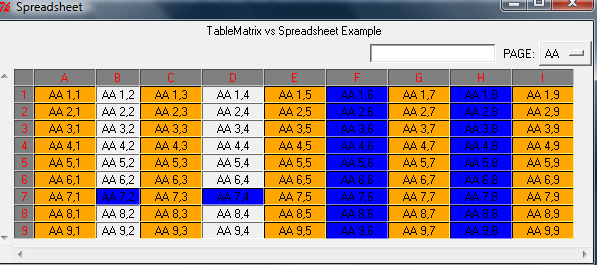
| Code perl : | Sélectionner tout |
1 2 3 4 5 6 7 8 9 10 11 12 13 14 15 16 17 18 19 20 21 22 23 24 25 26 27 28 29 30 31 32 33 34 35 36 37 38 39 40 41 42 43 44 45 46 47 48 49 | # Script show tag merging behavior with an option set in the # option database. # # Should display with one row hightlighted red and a cell in the row left-justified use Tk; use Tk::TableMatrix; use strict; my $mw = MainWindow->new; #$mw->optionAdd('*background', 'blue', 'interactive'); $mw->optionAdd( '*tablematrix*background', 'skyblue' ); my $table = $mw->TableMatrix( -rows => 5, -cols => 8, -cache => 1, #-bg => 'blue', ); $table->pack( -expand => 1, -fill => 'both' ); foreach my $row ( 0 .. 4 ) { #$table->tagRow('invalid', $row); # swap foreach my $column ( 0 .. 7 ) { $table->set( "$row,$column", "hello" ); #$table->tagCell('left', "$row,$column"); # swap } } # 'invalid' tag takes priority of 'left' tag, because it is created first, # so the cell 2,3 should be red and center anchored, but see below... $table->tagConfigure( "invalid", -background => 'red', -anchor => 'center' ); $table->tagConfigure( "left", -background => 'green', -anchor => 'w' ); $table->tagCell( 'left', '2,3' ); $table->tagRow( 'invalid', 2 ); # The tag priority is changed, so the cell 2,3 will be gree and 'w' achored. $table->tagRaise( 'left', 'invalid' ); # This would have the same effect as the above tagRaise #$table->tagLower('invalid', 'left'); MainLoop; |
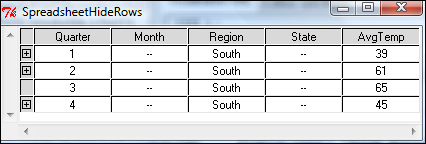
| Code perl : | Sélectionner tout |
1 2 3 4 5 6 7 8 9 10 11 12 13 14 15 16 17 18 19 20 21 22 23 24 25 26 27 28 29 30 31 32 33 34 35 36 37 38 39 40 41 42 43 | # Script show the new multi-number borderwidth option for tags # Borderwidth can be specified as a space separated list of # 4 numbers representing left right top bottom borders drawn in a cell # # In this example, the tag'ed row will have a large top/bottom border, and a normal # size left/right border use Tk; use Tk::TableMatrix; use strict; my $mw = MainWindow->new; #$mw->optionAdd('*background', 'blue', 'interactive'); $mw->optionAdd( '*tablematrix*background', 'skyblue' ); my $table = $mw->TableMatrix( -rows => 5, -cols => 8, -cache => 1, #-bg => 'blue', ); $table->pack( -expand => 1, -fill => 'both' ); $table->tagConfigure( "invalid", -background => 'red', -relief => 'raised', -bd => '1 1 5 5' ); $table->tagConfigure( "left", -anchor => 'w' ); foreach my $row ( 0 .. 4 ) { #$table->tagRow('invalid', $row); # swap foreach my $column ( 0 .. 7 ) { $table->set( "$row,$column", "hello" ); #$table->tagCell('left', "$row,$column"); # swap } } $table->tagCell( 'left', '2,3' ); $table->tagRow( 'invalid', 2 ); MainLoop; |

Proposer une nouvelle réponse sur la FAQ
Ce n'est pas l'endroit pour poser des questions, allez plutôt sur le forum de la rubrique pour çaLes sources présentées sur cette page sont libres de droits et vous pouvez les utiliser à votre convenance. Par contre, la page de présentation constitue une œuvre intellectuelle protégée par les droits d'auteur. Copyright © 2026 Developpez Developpez LLC. Tous droits réservés Developpez LLC. Aucune reproduction, même partielle, ne peut être faite de ce site et de l'ensemble de son contenu : textes, documents et images sans l'autorisation expresse de Developpez LLC. Sinon vous encourez selon la loi jusqu'à trois ans de prison et jusqu'à 300 000 € de dommages et intérêts.



